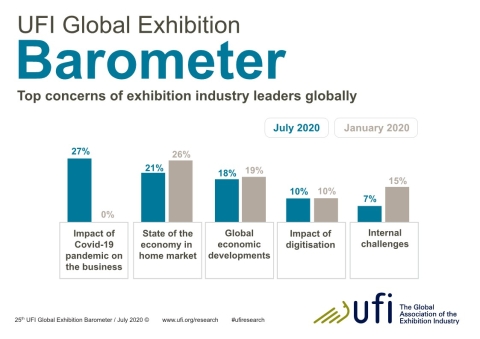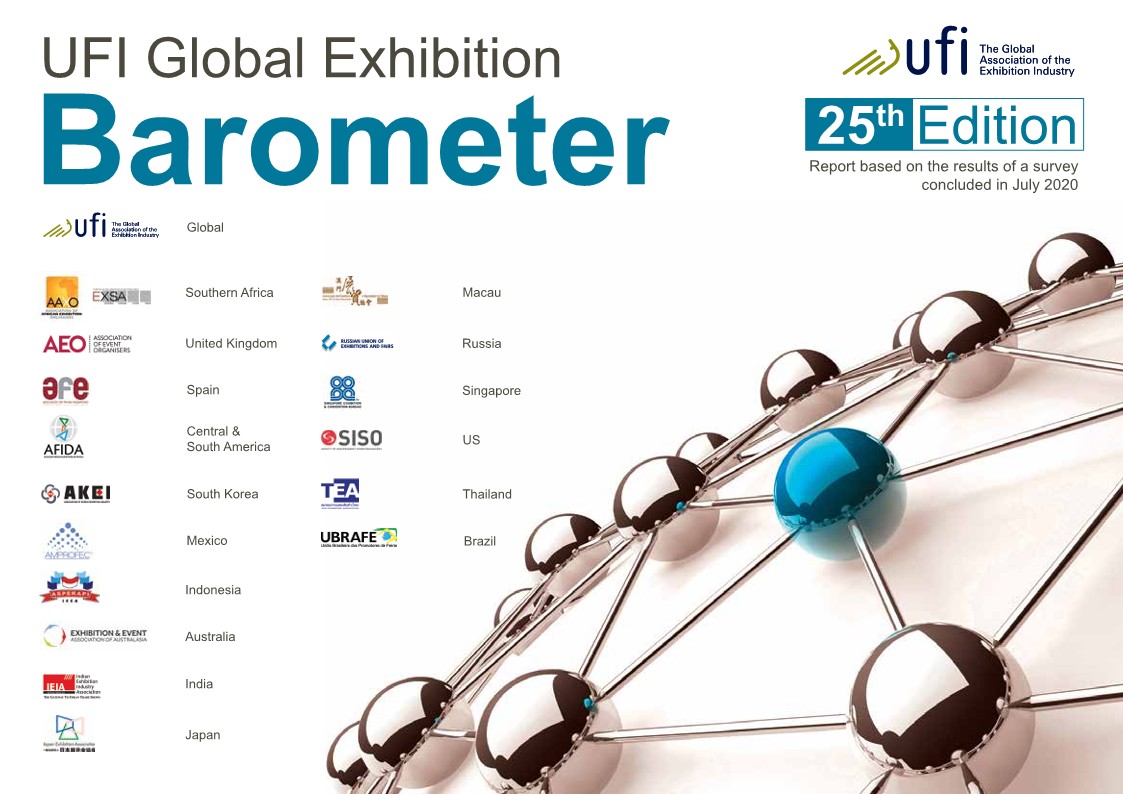UFI’s Global Barometer Indicates COVID-19 Impacts 95 Percent of Exhibition Companies

UFI, the Global Association of the Exhibition Industry, released the latest edition of its Global Barometer research that took the pulse of more than 450 exhibition organizers globally.
The report highlights the severe impact of the COVID-19 pandemic on the exhibition industry worldwide.
“On the back of an exceptional year in 2019, we are now seeing an unprecedented drop in revenues around the world,” said Kai Hattendorf, UFI Managing Director and CEO.
He added, “While the industry remains confident that it will bounce back, everyone is aware that this crisis will lead to major changes in the way exhibitions are produced, especially with a push towards more digital elements before, during and between events.”
Globally, 85 percent of companies declared their overall level of activity was “normal” in January. This quickly dropped to 15 percent in March, to reach between 5 percent and 6 percent in April, May and June.
For both April and May, 73 percent of companies worldwide declared “no activity”. With a majority of companies expecting “local” and “national” exhibitions to open again during the second half of 2020, the level of activity is expected to slowly increase.
Two companies out of three project at least a “reduced” level of activity in the last quarter of 2020.
In all regions, most companies believe that exhibitions with an international scope will not open until 2021.
Globally, revenues for the first half of 2020 dropped by two thirds on average, compared with the same period last year. Looking at 2020 as a whole, it is currently expected that globally revenues will represent only 39 percent of those of 2019.
In terms of profits, a strong level of performance was reached in 2019, with 45 percent of companies declaring an increase of more than 10 percent for 2019 when compared to 2018.
The sharp drop in revenues that occurred in 2020 has led to a loss for 39 percent of companies, and only 7 percent of companies currently expect a stable or increased profit for 2020.

Forty-four percent of companies that participated in the research have stopped all of their investments. At the same time, 50 percent of companies are increasing their investments in digitalization programs.
By comparison, investments have decreased or been stopped for 55 percent of companies in programs related to diversity and 54 percent in those related to sustainability.
The survey also tackles possible driving trends for the format of exhibitions in the coming years. Global results indicate that 57 percent are confident that “COVID-19 confirms the value of face-to-face events”, anticipating that the sector will bounce back quickly, whereas 31 percent are “not sure” and 12 percent are “not sure at all” or “disagree completely”.
This latest edition of UFI’s bi-annual industry survey was concluded in June 2020 and includes data from a record 459 companies in 62 countries and regions.
The study delivers outlooks and analysis for 20 countries and regions: Argentina, Australia, Brazil, China, Colombia, Germany, India, Indonesia, Italy, Japan, Mexico, Russia, South Africa, Singapore, South Korea, Spain, Thailand, the UAE, the UK and the US. In addition, it analyses five aggregated regional zones.
“We sincerely thank all companies who took part in this study, as its results provide strong insights, for 25 markets and regions, to several key questions raised in relation to the crisis,” said Christian Druart, UFI Research Manager.
Even with the difficult environment, a majority of companies did not receive any public financial support. At the same time, 44 percent did, and for a majority of those, it related to less than 10 percent of their costs.
Results indicate that, on average, companies consider that the transition of the exhibition industry is more than halfway for digitalization (2.9 on a scale of 1-5), diversity (2.9) and sustainability (2.8).
It can be noticed that those ratings do not vary much from one region to another. Out of the three areas, digitalization programs are those where COVID-19 had the most impact (“strong” or “significant” for 60 percent of companies). Globally, every second company has increased their investments in that area.
By comparison, investments have decreased or been stopped for 55 percent of companies in their programs related to diversity, and 54 percent for those related to sustainability.
Around one company out of two indicates that public investments are “essential and necessary for most of the investments” required towards digitalization (50 percent of companies) and sustainability (46 percent), and “necessary for a significant share” towards diversity (49 percent).
Most important business issues “Impact of COVID-19 pandemic on the business” is considered as the most important business issue (27 percent of combined answers).
Also, for the first time, “Impact of digitalization” (10 percent of answers) joins the “State of the economy in home market” (21 percent) and “Global economic developments” (18 percent) in the top priorities.
In line with UFI’s objective to provide vital data and best practices to the entire exhibition industry, the full results can be downloaded at http://www.ufi.org/research.
The next UFI Global Barometer survey will be conducted in December 2020.


Add new comment